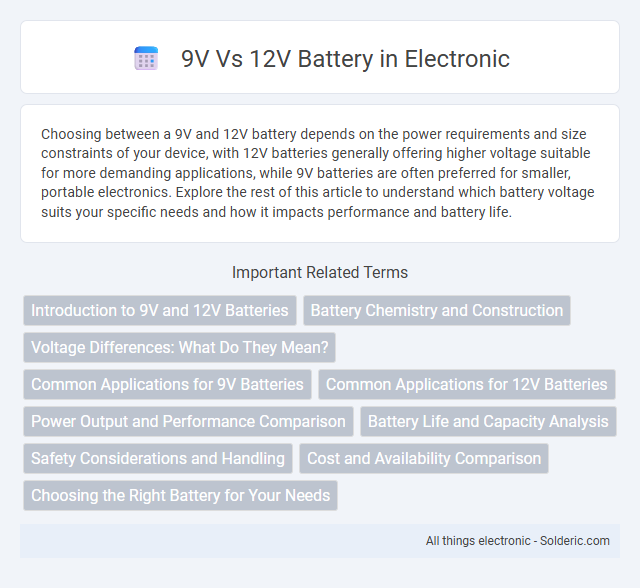Choosing between a 9V and 12V battery depends on the power requirements and size constraints of your device, with 12V batteries generally offering higher voltage suitable for more demanding applications, while 9V batteries are often preferred for smaller, portable electronics. Explore the rest of this article to understand which battery voltage suits your specific needs and how it impacts performance and battery life.
Comparison Table
| Feature | 9V Battery | 12V Battery |
|---|---|---|
| Voltage | 9 Volts | 12 Volts |
| Common Use | Smoke detectors, handheld devices, small electronics | Automotive, security systems, backup power |
| Size | Compact, rectangular | Larger, vary by type (e.g., lead-acid, lithium) |
| Capacity | Typically 500-600 mAh (alkaline) | Varies widely; automotive lead-acid 40-100 Ah |
| Weight | Lightweight (~45 g) | Heavy (several kg depending on type) |
| Lifespan | 1-2 years typical shelf life | 3-5 years for rechargeable lead-acid |
| Rechargeability | Generally non-rechargeable | Both rechargeable and non-rechargeable options |
| Cost | Low-cost | Higher cost, depends on type and capacity |
Introduction to 9V and 12V Batteries
9V and 12V batteries serve distinct purposes based on their voltage outputs and applications. 9V batteries are commonly used in small electronic devices like smoke detectors and handheld radios, offering compact size and convenience. In contrast, 12V batteries provide higher power suitable for automotive use, larger flashlights, and certain RC vehicles, delivering more sustained energy for demanding tasks.
Battery Chemistry and Construction
9V batteries typically use alkaline or lithium chemistry, featuring a rectangular shape with multiple smaller cells connected in series, providing a higher voltage in a compact form. In contrast, 12V batteries often consist of lead-acid, lithium-ion, or nickel-metal hydride chemistry, with a larger, heavier design containing six 2-volt cells internally connected for higher capacity and discharge rates. Understanding the differences in battery chemistry and construction helps you choose the right battery for your device's voltage and power requirements.
Voltage Differences: What Do They Mean?
A 9V battery provides 9 volts of electrical potential, ideal for low-drain devices like smoke detectors and small electronics, while a 12V battery delivers higher voltage suited for more power-demanding applications such as car engines and larger appliances. The voltage difference directly impacts the energy output, with 12V batteries supplying greater current and torque, enabling more robust performance. Using the appropriate voltage ensures device compatibility and prevents potential damage or inefficiency caused by under- or over-voltage conditions.
Common Applications for 9V Batteries
9V batteries are commonly used in smoke detectors, transistor radios, and handheld test equipment due to their compact size and reliable voltage output. They are also popular in certain types of portable electronic devices like guitar pedals and walkie-talkies. These batteries offer a stable voltage that makes them ideal for devices requiring consistent power in a small form factor.
Common Applications for 12V Batteries
12V batteries are commonly used in automotive applications, powering cars, motorcycles, and RVs due to their ability to deliver higher current for starting engines. They also serve as backup power sources in uninterruptible power supplies (UPS) and are widely employed in solar energy systems for storing electricity. If you're choosing a battery for high-drain devices or vehicle use, a 12V option offers greater capacity and reliability compared to 9V alternatives.
Power Output and Performance Comparison
A 12V battery delivers higher power output compared to a 9V battery, making it suitable for devices requiring greater energy consumption and sustained performance. While a 9V battery is compact and often used in low-drain gadgets like smoke detectors, a 12V battery powers equipment such as car alarms and portable electronics more efficiently. Your choice between these batteries should consider voltage requirements and the power demands of your device to ensure optimal performance.
Battery Life and Capacity Analysis
A 12V battery typically offers higher capacity and longer battery life compared to a 9V battery due to its greater voltage and often larger size, enabling more energy storage. The 9V battery, while compact and convenient for small devices, generally has lower milliampere-hour (mAh) ratings, resulting in shorter operational time between charges or replacements. Understanding the power requirements of your device ensures optimal usage and maximizes the efficiency of either battery type.
Safety Considerations and Handling
When comparing 9V and 12V batteries, 9V batteries typically pose lower safety risks due to their lower voltage and current output, making them safer for casual handling and small electronic devices. 12V batteries, often used in automotive or larger electronic applications, require careful handling to avoid short circuits, overheating, or potential electric shocks due to their higher voltage and current capabilities. Always ensure your safety by using proper insulation, avoiding direct contact with terminals, and storing batteries in a cool, dry place to prevent accidental discharge or damage.
Cost and Availability Comparison
9V batteries generally cost more per unit due to their compact design and specialized use, whereas 12V batteries, commonly found in car and backup power applications, are often more cost-effective per ampere-hour. Availability of 9V batteries is widespread in retail stores and online, catering to smaller electronic devices, while 12V batteries are widely available but typically sold through automotive or specialty battery suppliers. Consumers should consider both cost per capacity and accessibility based on their specific power requirements when choosing between 9V and 12V batteries.
Choosing the Right Battery for Your Needs
Choosing between a 9V and 12V battery depends on your device's voltage requirements and power consumption. A 9V battery is ideal for low-power electronics like smoke detectors and small radios, while a 12V battery suits automotive applications, larger alarms, and power tools. Evaluating the device's voltage specification and runtime will ensure optimal performance and battery life.
9V vs 12V battery Infographic

 solderic.com
solderic.com